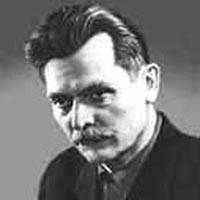presents
 Yashin, Aleksandr Yakovlevich. Pseudonym of Aleksandr Yakovlevich Popov. Born 27 March (14 March, Old Style) 1913 into a peasant family in the village of Buldnovo, Vologodskaya oblast.
Yashin, Aleksandr Yakovlevich. Pseudonym of Aleksandr Yakovlevich Popov. Born 27 March (14 March, Old Style) 1913 into a peasant family in the village of Buldnovo, Vologodskaya oblast. In 1931 he graduated from the pedgogical tekhnikum in Nikolsk. He worked as a village teacher and for various newspapers. His first collection of poems Songs to the North (Pesni Severu") was published in 1934. In 1935 Yashin moved to Moscow. His second collection of poetry was Northern Woman (Severnyaka), 1938. He enrolled in the Gorky Institute of Literature and graduated in 1941. At the outbreak of the the Great Patriotic War (World War II), he volunteered and was sent to the front. As a military correspondent and political worker, he took part in the defense of Leningrad and Stalingrad and the liberation of the Crimea. During this time ne published two more collections of poems: It Was on the Baltic (Na Baltike bylo) and City of Wrath (Gorod gneva). After the war, Yashin spent much time traveling, to the north, to the Altai, to hydroelectric dam construction sites, to the virgin lands. These travels were reflected in the collections Fellow Countrymen (Zemlyaki, 1946), Alyonka Fomina (1949) and Soviet Man (Sovetskii chelovek, 1951). Alyonka Fomina, which describes life in a post-war village in an idealized manner, was awarded the Stalin Prize. In the 1960s he published Barefoot on the Ground (Bosikom na zemle), Creation Day (Den' tvoreniya) and Insomnia (Bessonnitsa). In the 1950s, Yashin also began to work in prose. He caused a sensation in 1956 with Levers, a story protraying Party leaders as arrogant, duplicitous, bureaucratic, and pendantic. The tale Orphan (Sirota, 1962) is the story of two orphan brothers. One grows up to be a glib and smooth-talking opportunist, who goes to live in the city as a worthless parasite. The other brother stays in the village, working hard and diligently, even though his stubborn integrity earns him a reputation among officials as a troublemaker. Vologda Wedding (Vologodskaya svad'ba, 1965), set in a remote northern village during a wedding, shows the death of peasant culture and the misery and brutality among the people. The wives compete with one another in boasting of their husbands' swinishness and police records. Women and girls have forgotten or never learned the traditional songs, and the bride and groom travel in trucks, not troikas. Aleksandr Yashin died in Moscow on 11 June 1968. He was buriend in Bludnovo. Sources: XPOHOC Brown, Deming. "Soviet Russian Literature Since Stalin." Cambridge University Press. 1978. |